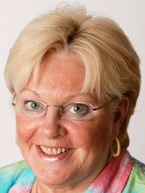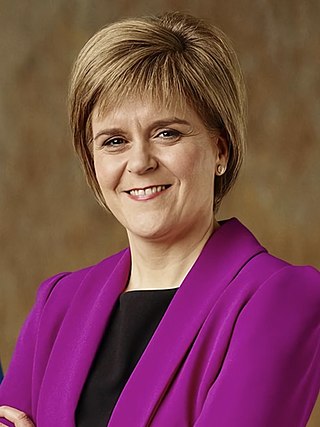
The Scottish National Party is a Scottish nationalist and social democratic political party. The party holds 63 of the 129 seats in the Scottish Parliament and 43 out of the 59 Scottish seats in the House of Commons in Westminster. It has 453 local councillors of 1,227.
Robert Douglas McIntyre was a Scottish physician and a Scottish National Party politician and Member of Parliament.

The politics of Scotland operate within the constitution of the United Kingdom, of which Scotland is a country. Scotland is a democracy, being represented in both the Scottish Parliament and the Parliament of the United Kingdom since the Scotland Act 1998. Most executive power is exercised by the Scottish Government, led by the First Minister of Scotland, the head of government in a multi-party system. The judiciary of Scotland, dealing with Scots law, is independent of the legislature and the Scottish Government. Scots law is primarily determined by the Scottish Parliament. The Scottish Government shares some executive powers with the Government of the United Kingdom's Scotland Office, a British government department led by the Secretary of State for Scotland.
In Scotland, the Scottish National Party (SNP) is a left social democratic political party which campaigns for Scottish independence. The SNP has controlled Scotland's devolved legislature since the 2007 election as a minority government, and were a majority government from the 2011 election and have been a minority government, since the 2016 election.
The Hamilton by-election in Hamilton, Lanarkshire, Scotland, was held on 2 November 1967. It was called after the former Labour MP, Tom Fraser, resigned in order to take up the position as head of the North of Scotland Hydro-Electric Board. The constituency had been a safe seat for Labour, who had taken over two-thirds of the vote there in every general election from 1945 to 1966, when only the Conservatives had stood against them.

The Scottish Conservative & Unionist Party is part of the UK Conservative Party active in Scotland. It is a centre right party. The party holds 31 of the 129 seats in the Scottish Parliament and 7 out of the 59 Scottish seats in the House of Commons in Westminster It has 209 local councillors of 1,227.

The Monklands East by-election was held on 30 June 1994, following the death of the Leader of the Labour Party John Smith, Member of Parliament (MP) for Monklands East in Scotland, on 12 May.

The Glasgow Camlachie by-election was held on Wednesday 28 January 1948, following the death of the sitting Member of Parliament, Campbell Stephen.
Parliamentary by-elections in the United Kingdom occur when a Member of Parliament (MP) vacates a House of Commons seat during the course of a parliament.
In the United Kingdom, general elections occur at least every five years. About 650 constituencies return a member of Parliament. Prior to 1945, electoral competition in the United Kingdom exhibited features which make meaningful comparisons with modern results difficult. Hence, unless otherwise stated, records are based on results since the 1945 general election, and earlier exceptional results are listed separately.

The Glasgow Govan by-election was held on 8 November 1973, following the death of John Rankin, Labour Party Member of Parliament for the Glasgow Govan constituency. Rankin had died one month earlier, on 8 October 1973. Rankin had held the seat since 1955. With the exception of a narrow Conservative victory in 1950, the seat had been solidly Labour-held since 1918. For the by-election the Labour Party nominated Harry Selby, a veteran activist in Glasgow and a former Trotskyist. It was later reported that Selby's selection had been controversial with some Labour members who felt that at the age of 61 he was too old to be starting a parliamentary career.

The 2011 Scottish Parliament election was held on Thursday, 5 May 2011 to elect 129 members to the Scottish Parliament.
The 2008 Glasgow East by-election was a by-election for the UK Parliamentary constituency of Glasgow East which was held on 24 July 2008. The election was triggered when, on 30 June 2008, the sitting MP David Marshall stood down due to ill health.
Elections to North Lanarkshire Council were held on 3 May 2012 on the same day as the 31 other local authorities in Scotland. The election used the twenty wards created under the Local Governance (Scotland) Act 2004, with 70 Councillors being elected. Each ward elected either 3 or 4 members, using the STV electoral system.
Events from the year 1945 in Scotland.
The 1954 Motherwell by-election was held on 14 April 1954. It was held due to the death of the incumbent Labour MP, Alexander Anderson. It was retained by the Labour candidate, George Lawson.
The 1940 Argyllshire by-election was a parliamentary by-election for the British House of Commons constituency of Argyllshire, on 10 April 1940.

The 2015 United Kingdom general election was held on Thursday 7 May 2015 to elect 650 Members of Parliament to the House of Commons. It was the only general election held under the rules of the Fixed-term Parliaments Act 2011 and was the last general election to be held before the United Kingdom would vote to end its membership to the European Union (EU). Local elections took place in most areas of England on the same day.

A general election was held in the United Kingdom on 7 May 2015 and all 59 seats in Scotland were contested under the first-past-the-post, single-member district electoral system. Unlike the 2010 general election, where no seats changed party, the Scottish National Party (SNP) won all but three seats in Scotland in an unprecedented landslide victory, gaining a total of 56 seats and taking the largest share of the Scottish vote in sixty years, at approximately 50 per cent. The Labour Party suffered its worst ever election defeat in Scotland, losing 40 of the 41 seats it was defending, including the seats of Scottish Labour leader Jim Murphy and the then Shadow Foreign Secretary Douglas Alexander. The Liberal Democrats lost ten of the eleven seats they were defending, with the then Chief Secretary to the Treasury Danny Alexander and former leader Charles Kennedy losing their seats. The election also saw the worst performance by the Scottish Conservative Party, which received its lowest share of the vote since its creation in 1965, although it retained the one seat that it previously held. In all, 50 of the 59 seats changed party, 49 of them being won by first-time MPs.










